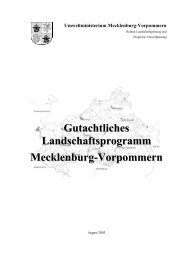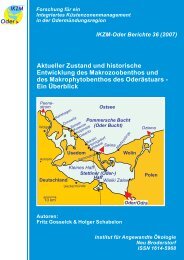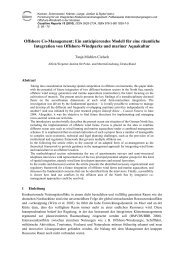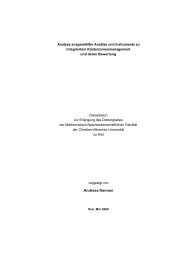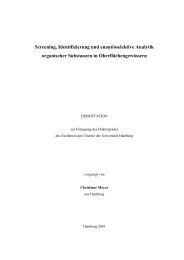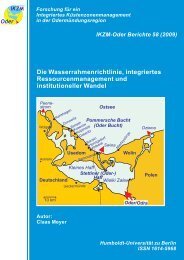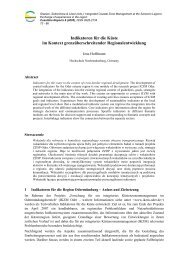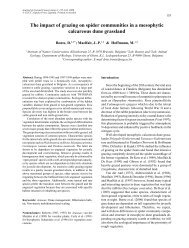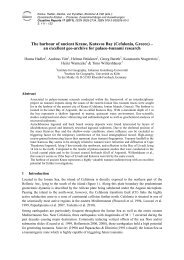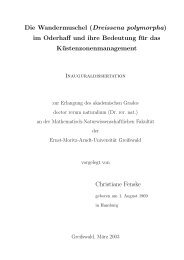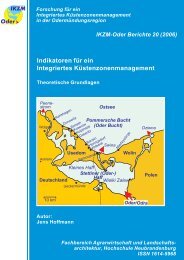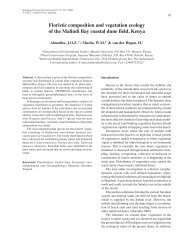Publikationen - Hintergrund - Küsten Union Deutschland
Publikationen - Hintergrund - Küsten Union Deutschland
Publikationen - Hintergrund - Küsten Union Deutschland
Erfolgreiche ePaper selbst erstellen
Machen Sie aus Ihren PDF Publikationen ein blätterbares Flipbook mit unserer einzigartigen Google optimierten e-Paper Software.
Kannen, Schernewski, Krämer, Lange, Janßen & Stybel (eds.):<br />
Forschung für ein Integriertes <strong>Küsten</strong>zonenmanagement: Fallbeispiele Odermündungsregion und<br />
Offshore-Windkraft in der Nordsee<br />
Coastline Reports 15 (2010), ISSN 0928-2734, ISBN 978-3-9811839-7-9<br />
S. 59 - 70<br />
Offshore Co-Management: Ein antizipierendes Modell für eine räumliche<br />
Integration von Offshore-Windparks und mariner Aquakultur<br />
Abstract<br />
Tanja Michler-Cieluch<br />
Alfred-Wegener-Institut für Polar- und Meeresforschung, <strong>Deutschland</strong><br />
Taking into consideration increasing spatial competition in offshore environments, this paper deals<br />
with the potential of future integration of two different business sectors in the North Sea, namely<br />
offshore wind energy generation and marine aquaculture (mariculture), the latter focusing on the<br />
cultivation of mussels. The present article presents the key findings of a transdisciplinary doctoral<br />
thesis on the social/human dimensions of such wind farm-mariculture integration. The<br />
investigation was driven by the fundamental question – is it really possible to continue to manage<br />
and develop all the different and frequently overlapping maritime activities independently of one<br />
another? And was initiated by the joint research project Zukunft Küste – Coastal Futures in June<br />
2004. Altogether, it was the objective to find future directions for implementing and managing<br />
cross-sectoral ocean-use activities.<br />
The introductory section briefly describes the present ocean use situation of the German North Sea,<br />
including the implementation of offshore wind farms. Focus is placed on the idea to combine<br />
different ocean uses such as wind farming and marine aquaculture under a combined management<br />
schemes. It is emphasized that an actual realization of such a project faces a number of manageable<br />
to complex socio-economic, technical and legal planning challenges, such as the provision of an<br />
institutional and regulatory framework that governs multiple offshore use.<br />
In the following the article refers to the concept of an adapted form of co-management as the<br />
theoretical framework to provide guidance in the management approach for integrating wind farms<br />
and mariculture in an offshore location.<br />
The methodological section substantiates the use of questionnaire surveys and semi-structured<br />
telephone interviews with representatives of the two principal potential adopter groups for this kind<br />
of spatial integration, namely wind farm developers/operators and mussel harvesters.<br />
In the results and discussion section the article presents the identified necessary organizational and<br />
regulatory framework for a future integration of offshore wind farms and marine aquaculture, and<br />
discusses the fundamental concerns that can be identified from the interviews. Finally, a possibility<br />
is shown how land use conflicts in the offshore area of the North Sea by integrative comanagement<br />
approaches could be resolved.<br />
1 Einleitung<br />
Konkurrierende Nutzungskonflikte in einem dicht besiedelten und vielfältig genutzten Raum wie der<br />
deutschen Nordseeküste sind eine unvermeidbare Folge der global anwachsenden Ressourcenkonflikte<br />
und -verknappung (Wirtz et al. 2003). So führt die hohe Entwicklungsdynamik im Meer und an der<br />
Küste dazu, dass der verfügbare Raum immer mehr zu einer endlichen Ressource wird. Diese<br />
Inanspruchnahme bedarf der Regelung, in der das Instrument des Integrierten <strong>Küsten</strong>managements<br />
ergänzend zur planorientierten Raumordnung eingesetzt werden soll (BMVBS/BBR 2006).<br />
Interessenskonflikte zwischen einzelnen Nutzungen wie z. B. Offshore-Windenergie, Schifffahrt,<br />
militärische Aktivitäten, Tourismus, Fischerei und Naturschutz müssen frühzeitig erkannt und neue<br />
und innovative Lösungsansätze gefunden werden, die bislang mit dem Management der knappen<br />
Ressource Raum noch nicht verbunden waren.



